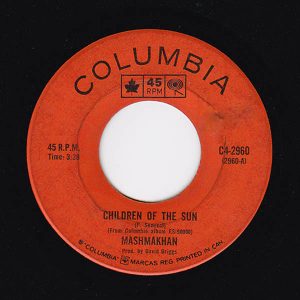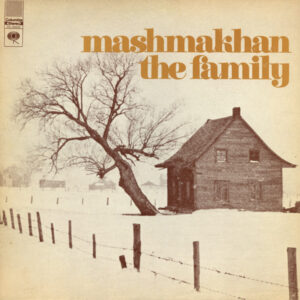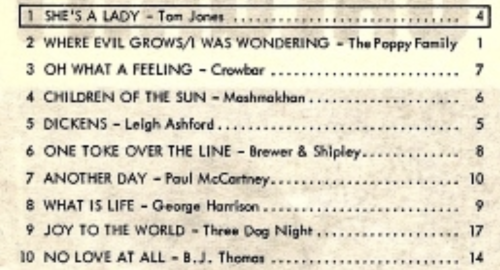#53: Children Of The Sun by Mashmakhan
City: Calgary, AB
Radio Station: CKXL
Peak Month: April 1971
Peak Position in Calgary ~ #4
Peak position in Vancouver ~ did not chart
Peak Position on Billboard Hot 100 ~ did not chart
YouTube: “Children Of The Sun”
Lyrics: “Children Of The Sun”
Mashmakhan was formed in 1969 in the southwestern Quebec town of L’Île-Perrot, by the Ottawa River near the St. Lawrence. In 1960, Pierre Sénécal, Brian Edwards (born 1943 in Saskatoon, SK), Jim Nuchter and Rayburn Blake first met in Montreal. Drummer Jim Nuchter failed to turn up for a booked performance. Drummer Jerry Mercer (born Newfoundland in 1939) was invited to replace Nuchter. Bass guitarist and vocalist Edwards quit shortly after. But the other three teenagers, Sénécal, Blake and Mercer continued to perform at local Montreal dance halls under names like the Phantoms, Ray Blake’s Combo, and the Dominoes. Sénécal played flute, organ and piano. Rayburn Blake was the lead guitarist.
Edwards rejoined the band to make the Dominoes a foursome. By 1965 the group called themselves The Triangle. They backed up local R&B singer Trevor Payne. They worked with Payne for four years until being discovered by record producer Bob Hahn. He recorded demos for the group in March 1969 and helped them get signed with Columbia Records in Toronto. The band and changed their name from the Triangle to Mashmakhan after a variety of hashish sold by a local dealer, to appeal to a modern audience.
The band’s first single release was “As the Years Go By” which sold 100,000 copies in Canada, 500,000 copies in the U.S., and over 1,000,000 copies in Japan. This led to a concert dates for Mashmakhan in Tokyo in July 1971 where the band opened for Grand Funk Railroad. “As the Years Go By” received much publicity and made Mashmakhan an international success story. The song was covered in Japan by Jimmy Takeuchi & His Exciters. In 1982 a disco band from Quebec named Doktor released a disco version of “As the Years Go By”. The B-side of “As the Years Go By” titled “Days When We Are Free” was a Top 5 hit in 1970 in Winnipeg (MB), Smith Falls (ON), and Medicine Hat (AB).
In Canada, Mashmakhan had concert dates in Montreal, Ottawa, the Transcontinental Pop Festivals in Calgary (AB), Winnipeg (MB) and Toronto at the CNE Stadium, Trois-Rivières (PQ), Summerside (PEI), Rouyn-Noranda (PQ), Cambellton (NB), Fredericton (NB), Moncton (NB), Saint John (NB), Amherst (NS), Sydney (NS), New Glasgow (NS), Bridgewater (NS), Kentville (NS), Antigonish (NS), Joliette (PQ), Quebec City, Salaberry-de-Valleyfield (PQ), Shawinigan (PQ), Thunder Bay (ON), and North York (ON). The band had multiple concert dates in Montreal, Toronto and Calgary.
The 2003 documentary film titled Festival Express, pieced together from footage that had been buried in a Toronto garage for decades, shows throngs of long-haired fans storming the gates to attend the Festival Express on June 27, 1970. The hippies were protesting the ticket price of $9 for one day, and $14 for the two concerts on June 27 & 28. Since Woodstock had ended up being a free concert festival event, the music fans storming the gates thought that all music should be free. Police on horseback scrambled to quell what was becoming a riot. Jerry Garcia of the Grateful Dead offered to play a free set with a group of other musicians outside the gates to placate the intruders.
Mashmakhan played at Toronto’s Massey Hall in May 1970 as an opening act for Santana.
The Transcontinental Pop Festivals or Festival Express, took place in Toronto June 27-28, Winnipeg on July 1, and Calgary July 4-5, 1970. It was like a traveling Woodstock. The lineup of performers included The Grateful Dead, Janis Joplin, The Flying Burrito Brothers, Mountain, Delaney & Bonnie & Friends, Ian & Sylvia, Eric Anderson, Tom Rush, The Ides of March, Mountain, The Band and Buddy Guy played shows in Toronto, Winnipeg and Calgary. Other acts, such as Traffic, and Ten Years After, joined them for one-off appearances. Mashmakhan was part of the line-up.
Originally, The Festival Express was scheduled to start in Montreal on June 24, 1970. But just a few weeks before the festival concert opener, Montreal Mayor Jean Drapeau opposed those plans since June 24th was also St. Jean-Baptiste Day, a religious holiday in Quebec. Tickets had to be refunded. The final stop on the tour was planned for Vancouver. But the hoped for west coast show ended up being been cancelled when the Empire Stadium at the PNE became unavailable in April 1970. This was because the PNE was concerned about having concert goers on the Empire Stadium astro-turf. On May 1, 1970, the Globe & Mail explained “it was impossible to get the (Empire) stadium in Vancouver, since the field is covered with Astro-Turf, a type of very expensive artificial grass made of plastic, which wouldn’t stand up to the wear and tear” of the festival attendees.
The series of concerts was a “festival express” since the organizers rented a train from Canadian National Railways which ended up taking the performers from Toronto to Winnipeg to Calgary, with an overnight stop that included Saskatoon. In Saskatoon, the musicians spent over $800 on a trip to a liquor store. Rayburn Blake recalls some of the Canadian whiskey was spiked with LSD the Grateful Dead brought with them.
Rayburn Blake recalls that the Festival Express train was a great experience. Things were free and easy during the constant jam sessions which brought musicians together 24 hours a day in the antique cars designated for such. Of those jam sessions, Blake remembers Janis Joplin learning how to play Me and Bobby McGee on guitar. The Festival Express concerts resulted in Mashmakhan performing before over 60,000 concert goers.
Mashmakhan followed “As the Years Go By” with two singles, “Gladwyn” and “Children Of The Sun.” These were featured on their debut self-titled album. The liner notes by Herbert Aronoff of the Montreal Gazette explain “Mashmakhan is the name of a group with roots deep into the natural goodness of music like black rock and blue soul, long years of jamming through Montreal summers, and gigging through Montreal winters, has made Mashmakhan a group for all seasons. This album is the first flower from a fertile garden. Dig it.”

“Children Of The Sun” is a song about the need to return to beauty. The “people of the cities” are “dying a little every day” from habits that leave them disconnected from the land.
“Children Of The Sun” peaked at #4 in Calgary, and also charted in Edmonton and Pointe Claire (QC).
Mashmakhan was one of two contributors to the musical score of the 1971 NFB film Epilogue/Fieve and recorded the song “Couldn’t Find the Sun” for the movie. Then, for some unknown reason, the bottom fell out. Mashmakhan’s second album, The Family, was released in 1971. It was a commercial failure. Fan support dwindled. Although they had a few good single releases, Mashmakhan didn’t have the right formula to make it back to the top. Although The Family did sell well in Japan, Mashmakhan split up shortly after the album lacked any commercial uptake in the all important North American record market.

In the summer of 1973, Mashmakhan had a #12 hit in Winnipeg titled “Dance A Little Step”.
Rayburn Blake later joined the Lisa Hartt Band for seven years. Next Blake worked at Steve’s Music Store, and then Long and McQuade in Toronto, first selling, then repairing guitars. The now lives in Niagara-on-the-Lake, Ontario, and is 78-years-old.
Jerry Mercer subsequently played for Roy Buchanan, and the Wackers. Then he became the drummer for April Wine in 1973, with his first concert as an opening band for Three Dog Night and T.Rex. Mercer retired from playing with April Wine in 2009. In addition to performing, Mercer was also involved in manufacturing drums with a company he co-founded with Bill Hibbs called Monolith Drums. Briefly assuming the brand name Solstice Drums, now back to Monolith and celebrated 20 years of drum making before retiring from that gig.
In 1978 Pierre Sénécal released the single “Un Coin De Ciel Bleu”. He also released another single titled “Jolie Milady”. As well he added soprano sax to his range of instruments on stage. In later years he appeared on TV in Quebec performing a tribute medley of songs by Ginette Reno.
Brian Edwards later formed a group called Riverson. In the mid-70s Brian teamed with singer Louise Rockwood of Toronto (whom he later married) and they jointly performed on his brother Cliff Edwards’ Montreal CFCF T.V. show Hurtin’ Songs. Moving to Saskatoon they became a duo: Brian and Louise. They performed in local clubs and later attended the University of Saskatoon with Edwards earning Bachelor of Music Degree, majoring in Composition while Louise majored in Performance. Brian’s secondary passion was carpentry, designing and building a Cape Cod house on 40 acres outside of Saskatoon. Later moving to Calgary to perform in clubs, the duo subsequently left to entertain on the Princess Cruise Lines for 5 years. They returned to Saskatoon in 2000. Brian Edwards died in October 2016, at the age of 72.
March 23, 2024
Ray McGinnis
References:
“Mashmakhan – Canada concert dates,” setlist.fm.
“Brian Edwards Obituary,” Saskatoon Star-Phoenix, Saskatoon (SK), October 22, 2016.
Mike Balsom, “Local musician reminisces about career highlight,” Niagara-on-the-Lake Local, Niagaga-on-the-Lake, Ontario, July 8, 2020.
Melinda McCracken, “A Mobile Rock Festival For 4 Cities,” Globe & Mail, Toronto, May 1, 1970.
“Pierre Senécal performs Ginette Reno medley tribute,”

CKXL 1140-AM Calgary (AB) Top Ten | April 3, 1971

Leave a Reply